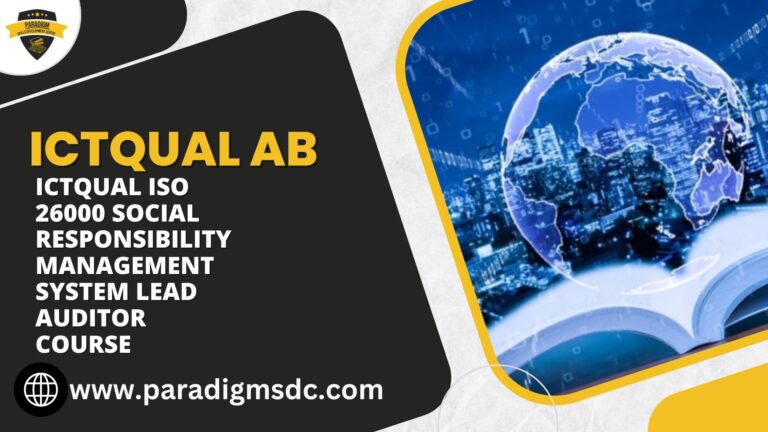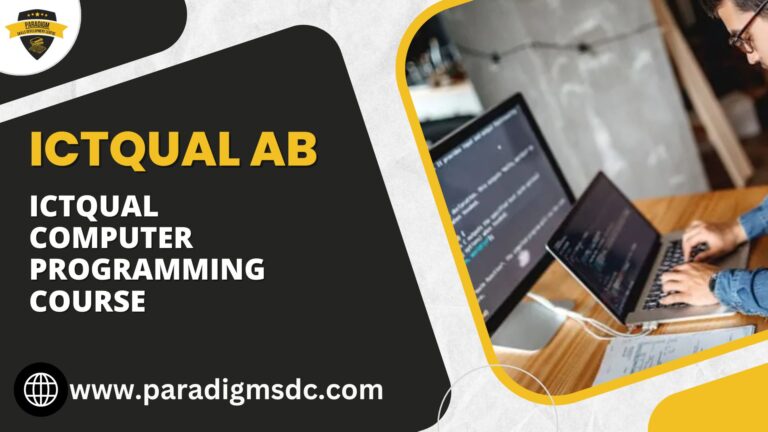Course Introduction
The ICTQual Level 3 Award in Assessing Vocationally Related Achievement is designed for individuals who are responsible for assessing vocational skills, knowledge, and understanding in both classroom and work-based settings. This qualification is ideal for those looking to enhance their assessment skills and ensure that learners achieve their vocational qualifications effectively. The course provides comprehensive training on the principles and practices of assessment, focusing on vocationally related achievement.
Course Overview
The ICTQual Level 3 Award in Assessing Vocationally Related Achievement equips participants with the knowledge and skills needed to assess learners’ vocational achievements accurately and fairly. The course covers various assessment methods, planning and conducting assessments, and providing constructive feedback. Participants will learn to maintain assessment records and adhere to quality assurance standards, ensuring that vocational assessments meet the required criteria.
Course Study Units
- Understanding Assessment in Education and Training
- Assessing Vocational Skills, Knowledge, and Understanding
- Assessing Competence in the Work Environment
- Principles and Practices of Internally Assuring the Quality of Assessment
Learning Outcomes
By the end of this course, participants will be able to:
Understanding Assessment in Education and Training:
- Comprehension of Assessment Principles: Understand the fundamental principles of assessment, including validity, reliability, and fairness, and their application in educational and training contexts.
- Knowledge of Assessment Methods: Demonstrate knowledge of various assessment methods, such as observation, questioning, and product-based assessments, and their suitability for different assessment purposes.
- Ability to Plan Assessments: Develop the skills to plan effective assessments by setting clear objectives, establishing assessment criteria, and designing assessment instruments aligned with learning outcomes.
- Effective Feedback Delivery: Acquire the ability to provide constructive feedback to learners, supporting their learning and development by identifying strengths and areas for improvement.
Assessing Vocational Skills, Knowledge, and Understanding:
- Understanding Vocational Assessment Requirements: Gain an understanding of the specific requirements and standards for assessing vocational skills, knowledge, and understanding in various industry sectors.
- Application of Validity and Reliability: Apply principles of validity and reliability to vocational assessments, ensuring that assessment results accurately reflect learners’ competence and performance.
- Development of Assessment Instruments: Develop competency in designing and implementing assessment instruments tailored to assess vocational skills, knowledge, and understanding effectively.
- Evaluation of Practical and Theoretical Competence: Develop the ability to assess both practical skills and theoretical knowledge, recognizing their interconnectedness and importance in vocational contexts.
Assessing Competence in the Work Environment:
- Conducting Workplace Assessments: Demonstrate proficiency in conducting assessments in authentic work environments, identifying suitable assessment opportunities and adapting assessment methods accordingly.
- Ensuring Assessment Authenticity and Fairness: Implement strategies to ensure the authenticity, fairness, and confidentiality of workplace assessments, maintaining integrity throughout the assessment process.
- Recordkeeping and Documentation: Develop skills in maintaining accurate assessment records and documentation, adhering to regulatory requirements and organizational policies.
- Providing Support to Learners: Offer guidance and support to learners during workplace assessments, facilitating their understanding of assessment requirements and promoting their confidence and competence.
Principles and Practices of Internally Assuring the Quality of Assessment:
- Understanding Internal Quality Assurance: Understand the role and importance of internal quality assurance processes in maintaining the quality and consistency of assessment practices.
- Standardization and Moderation: Implement standardization and moderation procedures to ensure consistency and fairness in assessment decisions across assessors and assessment sites.
- Feedback and Support for Assessors: Provide constructive feedback and support to assessors, helping them improve their assessment practice and maintain high standards of assessment quality.
- Maintaining Quality Assurance Records: Develop skills in maintaining comprehensive records of internal quality assurance activities, including standardization, moderation, and feedback processes.
Course Benefits
- Enhanced Assessment Skills: Develop the skills necessary to conduct effective and fair vocational assessments.
- Career Advancement: Improve employability and open up career progression opportunities in vocational education and training.
- Professional Recognition: Gain a recognized qualification that enhances credibility in the field of assessment.
- Quality Assurance: Ensure that vocational assessments adhere to high standards and legal requirements.
- Constructive Feedback: Learn to provide feedback that supports learners in achieving their vocational qualifications.
Who is this Course For?
This course is ideal for:
- Vocational trainers and educators responsible for assessing learners’ vocational skills and knowledge.
- Assessors working in classroom and work-based learning environments.
- HR professionals and training managers overseeing vocational training programs.
- Individuals seeking to formalize their assessment skills and gain a recognized qualification.
- Anyone interested in pursuing a career in vocational education and training.
Future Progression
Upon completing the ICTQual Level 3 Award in Assessing Vocationally Related Achievement, participants can further their career development by:
- Pursuing higher-level qualifications, such as the ICTQual Level 4 Award in the Internal Quality Assurance of Assessment Processes and Practice.
- Gaining experience and seeking advanced roles in vocational training and assessment, such as lead assessor or internal quality assurer.
- Engaging in continuous professional development through workshops, seminars, and additional certifications.
- Exploring opportunities in related fields, such as training and development, educational consultancy, or human resources.
- Contributing to the development and implementation of assessment policies and practices within their organizations.
The ICTQual Level 3 Award in Assessing Vocationally Related Achievement provides a robust foundation for anyone looking to excel in vocational assessment. By mastering the skills and knowledge covered in this course, participants can ensure that vocational assessments are conducted effectively and contribute to the professional development of their learners.







